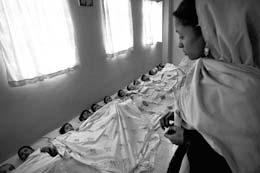Adoption policy ‘traps’ all kinds of families

Canada has stopped adoptions from Pakistan citing incompatibilities with the Islamic law over adoption and guardianship.
A Greater Toronto Area resident Shafiq Rehman said he was “shocked and depressed” over the new policy to restrict adoptions from Pakistan, saying he and his wife, Rehmat Jahan were hoping to adopt a Pakistani child, reported Pakistan Today.
Shafiq and his wife started the adoption process in 2011. They received an approval letter in June 2013 from the Ontario Ministry of Children and Youth Services confirming them as suitable candidates, the website said.
However, on July 2 Ottawa announced that it had to stop accepting adoptions from Pakistan.
The issue, according to Citizenship and Immigration Canada, is the Islamic practice of ‘kafala’ or guardianship which is common in most of the world’s 49 Muslim-majority countries like Pakistan.
Many other countries such as Australia, the United Kingdom and the United States have raised no issue about ‘kafala’ and are still open to adoptions from Pakistan.
Canada has, in some or all provinces, suspended adoptions from Cambodia, Georgia, Guatemala, Liberia, Nepal and Haiti for various reasons.
However, Pakistan is the only country banned on the basis of ‘kafala’.
Immigration spokesman Glenn Johnson said Canadian families seeking to adopt Pakistani children are required to obtain guardianship certificates from a Pakistani court and subsequently formalise an adoption in Canadian courts.
“However, legal and procedural requirements to obtain a guardianship certificate under Pakistan’s Guardians and Wards Act do not allow for subsequent adoption in the guardian’s country of residence,” Johnson said.
“Pakistan applies the Islamic system of ‘kafala’ which neither terminates the birth parent-child relationship nor grants full parental rights to the guardian. This means that there are further legal incompatibilities in accepting Canadian applications for adoption,” he said.
Michael Blugerman, one of the three licensed adoption agents in Ontario specialising in Pakistani adoptions, said the sudden move has caught prospective adoptive parents off guard, some of whom were already halfway through the long process.
“All kinds of families are trapped along the path,” he said.
“The Immigration’s explanation is inaccurate and misleading,” said Blugerman, who has been an adoption agent for 33 years and handles about eight Pakistani cases a year.
“Some of the parents have given up their jobs, or taken leave of absence to start the process abroad. It’s not the money but their emotional investment into the process,” he said.
To qualify to adopt, a prospective parent must undergo a minimum 10-week home study during which the applicant is assessed by a Registered Adoption Practitioner for being a suitable candidate.
The parent must complete a training course called PRIDE (Parental Resources for Information Development and Education) before the provincial children and youth services can issue an approval letter to a foreign adoption authority.
According to Pakistan’s guardian and wards law, a court may appoint outlanders as guardians, considering the well-being of a child; and also has the authority to allow the guardian to take the child abroad.
Pakistani lawyer Zia Awan said keeping the growing number of orphans and abandoned children and their miseries in view, new legislation for adoption by Islamabad was considered necessary and the Council of Islamic Ideology be liberal while considering the issue.
He also identified some cases of false and wrong guardianship in the past and said that there should be a monitoring agency at the provincial level to make the practice transparent and report any complaints against the guardians.
There would be no illegality if a Pakistani court appointed a foreign national a guardian and allowed them to take the child abroad and there is no legal hurdle for guardians to formalise an adoption in other countries having law on adoption, Awan added.
He further said that since Pakistan had no law for adoption, the only legal way available for foreigners to get a child was on the basis of a guardianship certificate.
About 2,000 foreign children are adopted by citizens or permanent residents of Canada every year.
Pakistan is one of the most populous countries in the world with a population of around 187 million.
There are around 79 million children living in Pakistan. The decades of political turmoil and the aftermath of natural disasters have affected the lives of millions of children. It is estimated that in the 2010 floods alone, ten million children lost their homes and their belongings, and no longer have access to health care and education.
According to SOS Children's Villages has been working with children and their families in Pakistan since 1975, many families simply cannot afford to send their children to school or take them to the doctor. Poverty forces children to go out to work. Often, children who have moved to urban areas with their families are found working - selling goods or shining shoes - on the city streets.
Only 63 per cent of Pakistani children finish primary school; most of these live in urban areas. Girls are less likely to attend or finish school than boys, and their education often suffers further due to early marriage. Before the 2010 floods it was estimated that one in three girls was married before they reached the age of 18. The post-flood number is believed to be higher.
Leave a comment









